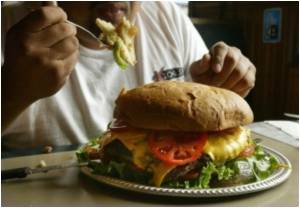Ghrelin, a hormone produced in the stomach and that acts on the brain to make you feel hungry, actually makes you crave more for high-calorie than low-calorie foods,concludes a new study.

According to Goldstone, the results also suggest that an increased release of ghrelin from the stomach into the blood may explain why a person who skips breakfast also finds high-calorie foods more appealing than low-calorie foods.
In the new study, healthy, nonobese adults-13 men and 5 women-viewed pictures of food on three separate mornings: once after skipping breakfast and twice about 90 minutes after eating breakfast. On one of the visits when subjects ate breakfast, they received an injection of salt water (as a control) 40 minutes before viewing the food pictures, and on the other visit with breakfast, they received an injection of ghrelin. Neither the volunteers nor the investigators were aware of which injection was given on which visit.
Pictures of high-calorie foods included chocolate, cake and pizza. Among the low-calorie foods pictured were salads, vegetables and fish. Using a keypad, the subjects rated how appealing they found each food picture.
The appeal of low-calorie foods did not differ significantly between visits. High-calorie foods were of similar appeal to low-calorie foods when subjects ate breakfast and then received a salt-water injection.
However, high-calorie foods, especially sweet foods, were of greater appeal when subjects fasted and when they received ghrelin after eating breakfast.
Advertisement
Goldstone's group obtained functional magnetic resonance images-MRIs- of brain activity while subjects rated how much the food pictures appealed to them. After analyzing these images, the researchers expect to identify the brain "reward" systems through which ghrelin affects food preferences.
Advertisement
Source-ANI















